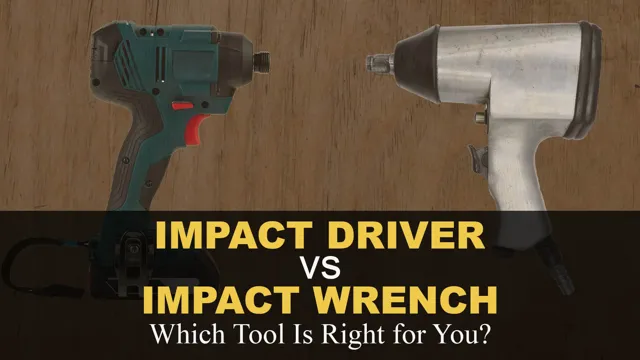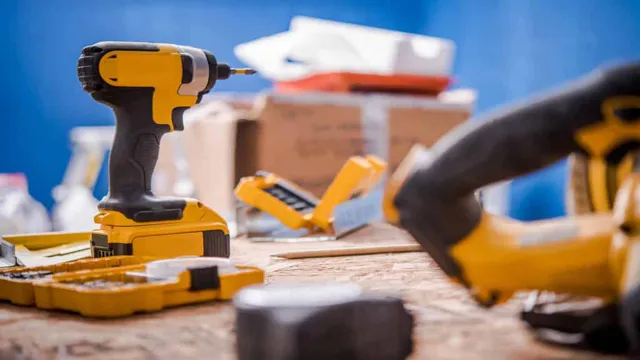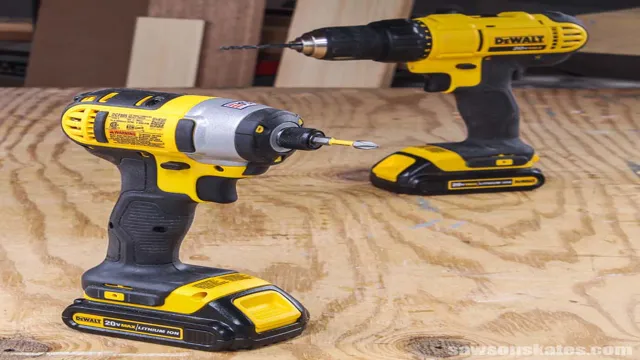What Drill Bits for Impact Driver: The Complete Guide to Finding the Right Bits
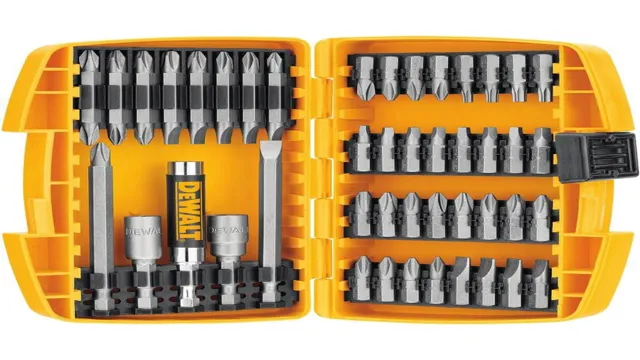
If you’re looking for a powerful and efficient way to drive screws and drill holes, an impact driver is an excellent tool to have in your toolbox. These tools deliver a strong rotational force that can make quick work of even the toughest jobs. But if you’re new to using an impact driver, figuring out which drill bits to use can be a bit confusing.
After all, not all drill bits are created equal, and some are better suited for impact driving than others. In this blog post, we’ll take a closer look at some of the key factors to consider when choosing drill bits for your impact driver. Whether you’re a DIY enthusiast or a professional tradesperson, this guide will help you choose the right bits for the job and get the most out of your impact driver.
So, let’s dive in!
Understanding Impact Drivers
As a DIY enthusiast or even a professional contractor, owning an impact driver is a great investment for your toolkit. Impact drivers are used for heavy-duty work, from loosening stubborn screws to driving large bolts. However, choosing the right drill bits for your impact driver is crucial for achieving the best results.
The key to selecting the right bits is to ensure that they are designed for use with an impact driver, rather than a standard drill. Impact driver bits feature a hexagonal shank that prevents slippage during heavy usage, in addition to being made from more durable materials than regular drill bits. It’s recommended that you invest in high-quality bits to avoid frequent replacements, and always match the bit size to the screws or bolts being driven.
With the right drill bits, your impact driver can more easily handle a range of jobs, making your work safer and more efficient.
How Impact Drivers Work
Impact drivers are powerful and efficient tools used in construction and other heavy-duty applications. They are designed to deliver high torque while reducing the amount of physical exertion required from the user. Impact drivers work by using a combination of rotational force and percussive blows to drive fasteners quickly and easily.
The tool features a collet that holds the bit securely, and when the trigger is pressed, an internal hammer mechanism delivers rapid bursts of torque. The hammering action reduces the amount of effort required to drive the fastener, even when working with thicker or denser materials. Impact drivers are popular among professionals because they are compact, lightweight, and very easy to use.
With its unique system, the impact driver is an excellent solution for driving large screws or bolts into tough materials. Thanks to its advanced features, it quickly surpasses the traditional drill-driver. So, if you need to work on heavy-duty applications, an impact driver is an essential tool that offers you lots of benefits.
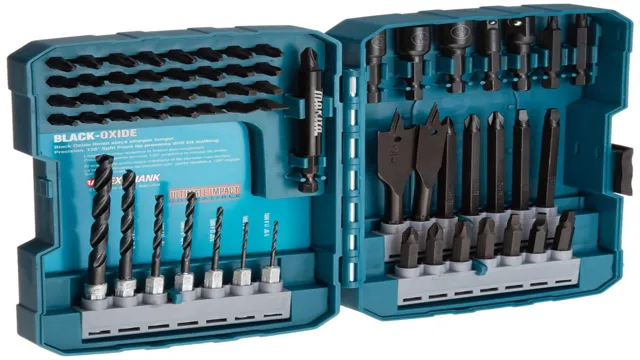
Advantages of Impact Drivers Over Regular Drills
Impact drivers are a great tool that provide many advantages over regular drills. Understanding what an impact driver is and how it works is important for getting the most out of it. Essentially, an impact driver is like a drill, but with a powerful twisting force that delivers more torque and quicker results.
They’re excellent for removing old bolts and screws that don’t want to budge, or for driving in new ones quickly and efficiently. Using an impact driver also puts less strain on your wrists, making it easier to use for extended periods of time without experiencing fatigue. Impact drivers are clearly superior to regular drills when it comes to certain jobs, making them an essential addition to any DIY enthusiast or professional tool kit.
Drill Bit Types
When it comes to using an impact driver, it’s essential to have the right drill bits for the job. There are various drill bit types available that will work with an impact driver, including standard twist bits, spade bits, and masonry bits. Twist bits are the most common and versatile of the three.
They’re ideal for drilling into wood, metal, and plastic, and range in size from small to large. Spade bits, on the other hand, are used for larger holes and are specifically designed for drilling into wood. Masonry bits are the perfect choice when drilling into concrete or brick, and feature a special carbide tip that ensures a high level of durability and strength.
No matter what type of material you are drilling into, it’s important to ensure that you choose the right drill bit for the job to avoid damaging your impact driver. So, the next time you need to drill into a particular material, make sure you have the right drill bit for your impact driver on hand to ensure precision and efficiency!
Twist Drill Bits
Twist drill bits are one of the most popular drill bit types among DIY enthusiasts and professionals alike. These versatile bits can be used in a wide range of materials, including wood, metal, and plastic. Twist drill bits are designed with a helical twist that allows them to cut into the material with ease, creating a clean and precise hole.
They come in various sizes and lengths to fit different drilling needs, from small holes for screws and nails to larger holes for plumbing and electrical work. With their affordability and versatility, twist drill bits are a must-have tool for any toolbox or workshop. So, whether you’re a DIY enthusiast or a professional contractor, you can never go wrong with having a set of twist drill bits in your arsenal.
Spade Bits
Spade bits are a type of drill bit that are commonly used for woodworking projects. They are characterized by their flat, paddle-shaped tip which allows them to bore large, flat-bottomed holes. Spade bits are ideal for drilling through softwoods like pine and cedar, and can also be used for shaping or enlarging existing holes.
One of the benefits of using spade bits is that they produce clean and precise holes, making them a good choice for fine woodworking. However, they do have some limitations, particularly when it comes to drilling through hardwoods or other tough materials. In these situations, a more specialized drill bit may be necessary to achieve the desired results.
Overall, spade bits are a versatile and useful tool for any woodworker, and are an essential addition to any toolkit.
Masonry Bits
When it comes to drilling through tough materials like masonry, you need the right tool for the job. That’s where masonry bits come in. These tough bits are designed specifically for drilling through bricks, concrete, and other masonry materials.
One of the unique features of masonry bits is their carbide-tipped heads, which can withstand the rigors of drilling through hard materials. Another important factor to consider when using masonry bits is the type of drill you’re using. You’ll need a drill with a hammer setting to effectively drill through masonry.
Keep in mind that masonry bits come in a variety of sizes, so choose the right one based on the size of the hole you need to drill. With the right bit and drill, you’ll be able to drill through even the toughest masonry materials with ease.
Auger Bits
If you are in need of a drill bit for a woodworking project, you may be wondering which type of drill bit to use. One useful type of drill bit is an auger bit. Auger bits are designed to cut through wood quickly and efficiently, making them great for larger holes.
These bits feature a spiral design that pulls the bit through the wood as you drill. This means less effort is needed and the bit stays on track. Auger bits are versatile and can be used for many types of projects, including creating holes for dowels, screws, and bolts.
They come in a range of sizes from 1/4-inch to 1 1/2-inch, so you can find the perfect size for your needs. So if you need a bit that can handle woodworking projects, give an auger bit a try and experience the efficiency and versatility it has to offer.
Choosing Drill Bits for Your Impact Driver
When it comes to choosing drill bits for your impact driver, there are a few key factors you need to consider. Firstly, you want to make sure the bits you select are compatible with your specific impact driver model. Additionally, you should think about the type of project you’re working on, as different bits are designed for different materials and applications.
For instance, if you’re drilling through wood, you’ll want to use a wood bit, whereas if you’re working with metal or masonry, you’ll need a different type of bit. Other factors to consider include the size and shape of the bit, as well as the material it’s made from. Ultimately, taking the time to carefully select the right drill bits for your impact driver can make a big difference in the quality and efficiency of your work.
So be sure to do your research and choose wisely! And don’t forget to make the most out of your impact driver by pairing it with high quality, durable bits to maximize its power and effectiveness.
Consider the Material You Will Be Drilling Into
When choosing drill bits for your impact driver, one crucial factor to consider is the material you will be drilling into. Different materials require different types of bits, and selecting the wrong one can lead to a subpar drilling experience or even damage to your materials. For example, if you’re drilling into wood, a twist bit with a pointed tip will suffice.
However, masonry materials such as concrete or brick require a specialised masonry bit with a tapered tip for the best results. For drilling through metals like steel, you’ll want to use a cobalt or titanium-coated bit to ensure a smooth drilling experience. Understanding the material you’ll be working with will help you to choose the right drill bit for your tasks and avoid any potential damage or mishaps.
So, before you start drilling with your impact driver, take the time to consider the material you’ll be working with and select the appropriate bit for the job at hand.
Match the Diameter of the Bit to Your Screw or Anchor
When it comes to using an impact driver, choosing the right drill bit can make all the difference in the world. The first step is to match the diameter of the bit to your screw or anchor. Using the wrong size bit can cause the screw or anchor to become loose or even damage your materials.
It’s also important to consider the type of material you’ll be drilling into. Some bits are better suited for wood, while others are designed for metal or concrete. You’ll also want to look for bits with a tapered design to help prevent slipping and ensure a more precise hole.
And don’t forget about the length of the bit – depending on the depth of your hole, you may need a longer or shorter bit. By taking the time to choose the right drill bit for your impact driver, you can work more efficiently and produce better results.
Choose Bits with Hexagonal Shanks
Impact driver drill bits come in various sizes and shapes, and choosing the right one can make all the difference in your DIY projects. When it comes to hexagonal shanks, they are an excellent option for impact drivers. Not only do they provide a secure grip and prevent slipping, but they also transfer torque more efficiently than round shank bits.
This means that you can apply more force with less effort, resulting in faster and smoother drilling. Furthermore, hexagonal shank bits are less likely to break or wear out, making them a durable and cost-effective choice. So if you own an impact driver, be sure to consider hexagonal shank drill bits for your next project.
Look for Impact Rated Bits
If you’re in need of new drill bits for your impact driver, be sure to look for impact rated bits. These special bits are designed to handle the high torque and vibration of an impact driver, ensuring that they won’t break or wear down easily. Impact rated bits are typically made of tougher materials, such as high-speed steel or carbide, that can withstand the rigors of heavy use.
When choosing your impact rated bits, consider the types of materials you’ll be working with. Different bits are designed to work best with different materials, such as wood, metal, or masonry. Be sure to select the appropriate bit for your project in order to get the best results.
Investing in quality impact rated drill bits can save you time and money in the long run. Not only will they last longer than regular bits, but they’ll also make your work more efficient and effective. So don’t skimp on your drill bits – choose impact rated ones that are up to the challenge of your next project.
Conclusion
When it comes to choosing the right drill bits for your impact driver, there’s no one-size-fits-all solution. It all depends on the type of material you’re working with and the job at hand. Whether you’re drilling through wood, metal, concrete, or anything in between, make sure you choose a drill bit that’s specifically designed to handle the task.
And remember, using the right tool for the job not only makes your work easier, but it also helps ensure the longevity of your tools and the quality of your finished product. So, choose wisely and happy drilling!”
FAQs
What size of drill bits are compatible with an impact driver?
Impact drivers require hex shank bits, typically in sizes of 1/4 inch or 3/8 inch.
Can I use regular drill bits with an impact driver?
It is not recommended to use regular round shank bits with an impact driver, as they may slip or damage the tool. Hex shank bits specifically designed for impact drivers are required.
What type of materials can impact driver drill bits be used on?
Impact driver drill bits can be used on a variety of materials such as wood, metal, plastic, ceramic, and masonry, depending on the specific bit.
What is the difference between impact driver drill bits and regular drill bits?
Impact driver drill bits have a hex shank specifically designed to fit in the chuck of an impact driver. They also have a torsion zone that helps absorb the torque generated by the impact driver.
Can impact driver drill bits be used with a regular drill?
Yes, impact driver drill bits can be used with a regular drill, but they may not provide the same torque absorption as they would with an impact driver.
How do I choose the right drill bit for my impact driver?
Consider the material you will be drilling, the size of the hole needed, and the type of shank required. Some popular options include spade bits, auger bits, and masonry bits.
What is the best way to care for and maintain impact driver drill bits?
Keep them clean and dry after use, store them in a protective case or sleeve, and sharpen them as necessary to ensure optimal performance.
